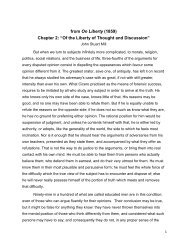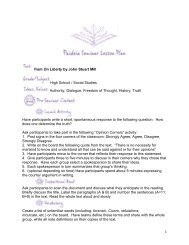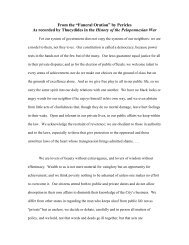Rousseau_contrat-social
Create successful ePaper yourself
Turn your PDF publications into a flip-book with our unique Google optimized e-Paper software.
labour, should remain desert and uncultivated, or peopled only by<br />
savages; lands where men’s labour brings in no more than the exact<br />
minimum necessary to subsistence should be inhabited by barbarous<br />
peoples: in such places all polity is impossible. Lands where the<br />
surplus of product over labour is only middling are suitable for free<br />
peoples; those in which the soil is abundant and fertile and gives a<br />
great product for a little labour call for monarchical government, in<br />
order that the surplus of superfluities among the subjects may be<br />
consumed by the luxury of the prince: for it is better for this excess<br />
to be absorbed by the government than dissipated among the individuals.<br />
I am aware that there are exceptions; but these exceptions themselves<br />
confirm the rule, in that sooner or later they produce revolutions which<br />
restore things to the natural order.<br />
General laws should always be distinguished from individual causes that<br />
may modify their effects. If all the South were covered with Republics<br />
and all the North with despotic States, it would be none the less true<br />
that, in point of climate, despotism is suitable to hot countries,<br />
barbarism to cold countries, and good polity to temperate regions. I see<br />
also that, the principle being granted, there may be disputes on its<br />
application; it may be said that there are cold countries that are very<br />
fertile, and tropical countries that are very unproductive. But this<br />
difficulty exists only for those who do not consider the question in all<br />
its aspects. We must, as I have already said, take labour, strength,<br />
consumption, etc., into account.<br />
Take two tracts of equal extent, one of which brings in five and the<br />
other ten. If the inhabitants of the first consume four and those of the<br />
second nine, the surplus of the first product will be a fifth and that<br />
of the second a tenth. The ratio of these two surpluses will then be<br />
inverse to that of the products, and the tract which produces only five<br />
will give a surplus double that of the tract which produces ten.<br />
But there is no question of a double product, and I think no one would<br />
put the fertility of cold countries, as a general rule, on an equality<br />
with that of hot ones. Let us, however, suppose this equality to exist:<br />
let us, if you will, regard England as on the same level as Sicily, and<br />
63











